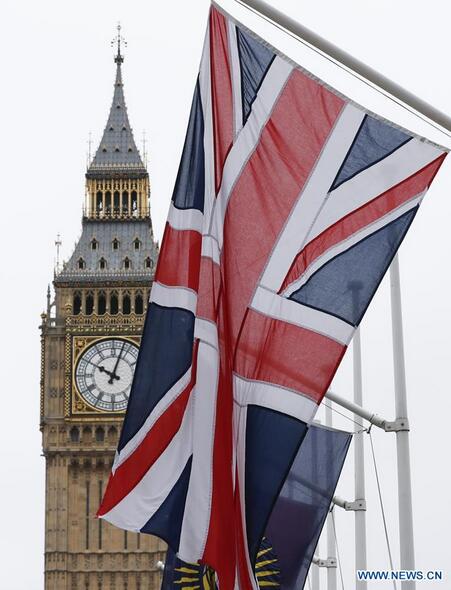Queen Elizabeth signs Brexit deal into law authorizing exit from EU
 0 Comment(s)
0 Comment(s) Print
Print E-mail Xinhua, March 17, 2017
E-mail Xinhua, March 17, 2017
 |
|
Photo taken on March 14, 2017 shows the "Big Ben" and the UK flag in central London, Britain. The British upper house of the Parliament passed the Brexit Bill Monday night, clearing the last hurdle for the government to trigger Brexit. [Photo/Xinhua] |
Queen Elizabeth has signed the Brexit bill, clearing the way for Prime Minister Theresa May to start talks to leave the European Union, it was learnt on Thursday.
House of Commons Speaker John Bercow announced Thursday that the European Union (Notification of Withdrawal) Bill has received Royal Assent from the queen, which was passed by the parliament on Monday.
A formal royal assent the queen is all that stands in the way of May informing Brussels of Britain's intention of leaving the European Union after 43 years.
The bill gives May the legal authority to trigger article 50 of the Lisbon Treaty, the laid down procedure within the EU for a member state wishing to leave. Once article 50 is triggered, it kick-starts a two year process for negotiating a new relationship between both sides.
May has not said precisely when she will trigger article 50, apart from saying for the past six months that it will be by the end of this month. She described the passing of the Brexit Bill by politicians as a defining moment for Britain.
The Brexit bill cleared its final hurdles in parliament this week after being fast tracked through both the House of Commons and House of Lords. Although attempts were made by remain supporters to amend the bill, it survived its parliamentary passage without change, signaling a clear victory for May's government.
Politicians were told formally in brief announcements to both houses of parliament of the Brexit bill receiving royal assent from the palace.
Under the British constitution all new legislation has to be signed by Queen Elizabeth before it can become law.
Once article 50 is triggered it will start a two-year period of negotiations between Britain and the EU to strike a new trade deal.
One of the failed amendments during the debates in parliament referred to the status of the more than 3 million EU citizens currently living in Britain, and their fate under Brexit.
May has insisted the status of EU citizens in Britain and the 1 million British people in EU countries will be priority during the negotiations with Brussels.
London Mayor Sadiq Khan made a fresh appeal Thursday to May to give an immediate cast-iron guarantee to EU nationals that they can stay in Britain after Brexit.
Sadiq wants the unilateral pledge, protecting the 3.3million EU citizens who currently live in Britain, to be given as soon as May triggers Article 50, formally starting the Brexit process.
In a message to the 1 million EU citizens in London, Khan said: "My message to them is clear: you are Londoners, you are welcome here and you deserve a commitment from the government that you can stay."
Khan said it is crucial that the government protects the EU citizens living in the UK and that there is broad support for guaranteeing their long term status.
He argued it is unacceptable that people who have made their lives in Britain and contributed to London and the country are now worried about their long-term future.
He has called for the interior department, the Home Office, to set up a separate simple and comprehensive process for all EU nationals legally in the UK to apply for permanent residence.
New research published by Khan reveals a quarter of London's construction workforce is from the European Union, pointing to a crippling effect that a Hard Brexit could have on homebuilding in the British capital.






Go to Forum >>0 Comment(s)